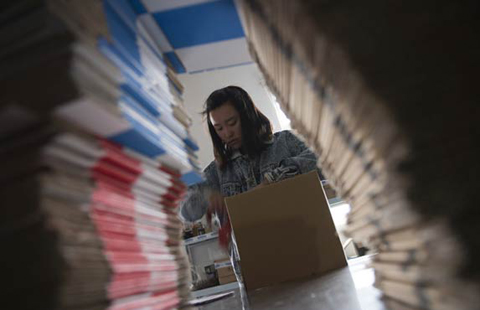Tech firms cut from approval list
Updated: 2015-02-27 11:25
By Paul Welitzkin in New York(China Daily USA)
|
||||||||
Analysts said China's decision to remove some of the world's leading technology companies from its state-approved purchase list is designed to aid the country's technology sector while addressing what Beijing sees as security concerns.
Reuters reported Wednesday that China dropped products from companies such as Apple Inc, Cisco Systems Inc and Intel Corp's security software firm McAfee. The list is used as a reference point for purchasing decisions by Chinese provincial governments. At the same time, China approved more locally made products for the list.
IT products produced by IBM and Microsoft remain "active for purchase" but no Cisco equipment is available, according to a government website.
Last year China announced a security review on imported technology equipment. Zuo Xiaodong, vice-president of the China Information Security Research Institute, a government think tank, said it is clear China wants more domestic IT products to replace overseas technology over which the country has no control. Zuo said regulators have no clear time frame for abandoning foreign products.
"Using more products made by Chinese companies in critical sectors makes Beijing feel safer about information security," Zuo said
Miao Wei, chief of the Ministry of Industry and Information Technology, said Chinese-developed IT products are critical to improving information security.
"Chinese officials are now trying to glom on to allegations of Western surveillance as a convenient excuse for a new set of policies that favor domestic producers at the expense of foreign ones in government procurement," Stephen Ezell, director of Global Innovation Policy at The Information Technology & Innovation Foundation in Washington said in an e-mail.
All of this comes amid increasing tensions over security between China and the US after revelations from documents provided by former National Security Agency consultant Edward Snowden about US efforts to hack into computers in China and that China may have had stolen data on the F-35 Lightning II jet. China has denied the accusation.
Earlier this year Beijing implemented rules requiring audits and source code identification aimed at technology companies that sell equipment to Chinese banks. That action helped to prompt a letter from trade groups representing US businesses in China to US officials including Secretary of State John Kerry, requesting they push the Chinese government to reverse the new policies.
"The effort has virtually nothing to do with legitimate security concern - the reality is that China has been trying to find ways to replace foreign-produced ICT/electronics products with domestically produced ones going back to 2009 well before anyone ever heard the name Snowden," said Ezell.
Ezell said Apple and the other companies affected by the Chinese government's decision have limited options to contest the decision. "Direct options for recourse through multilateral trade venues are limited largely because China has still failed to accede to the World Trade Organization's Government Procurement Agreement (GPA) despite a commitment to do so after it joined the WTO in 2001. The GPA prohibits restrictions on government purchases between member countries."
"I personally don't think that the US firms can do anything about this," said Baizhu Chen, associate professor of finance and business at the University of Southern California, in an e-mail. "They can take the matter to the WTO. According to the WTO, a country is legitimate to protect its industry for national security concerns. Besides, the US does the same thing against Chinese firms."
Apple, IBM, and Intel did not comment directly.
A spokesman for Cisco told China Daily in an e-mail that the company hasn't been able to verify the Reuters report, but it would be inaccurate to say Cisco can no longer do business in China.
Gao Yuan in Beijing contributed to this report.

 Russian opposition leader Nemtsov shot dead in Moscow
Russian opposition leader Nemtsov shot dead in Moscow
 Across America over the week (from Feb 20 to 26)
Across America over the week (from Feb 20 to 26)
 Phoenix landing
Phoenix landing
 Inside a Taobao village
Inside a Taobao village
 Testing mettle: Students appear for art college exam
Testing mettle: Students appear for art college exam
 Top 10 best-selling SUVs in Chinese mainland in 2014
Top 10 best-selling SUVs in Chinese mainland in 2014
 The eighth nine days: wild geese are flying back
The eighth nine days: wild geese are flying back
 China's biggest Akhal-Teke horse base
China's biggest Akhal-Teke horse base
Most Viewed
Editor's Picks

|

|

|

|

|

|
Today's Top News
China ends UN council presidency
Tech firms cut from approval list
Yuan on move, but not to top
'Star Trek' legend Leonard Nimoy dies at 83
EB-5 could harbor fraud: report
US Representative requests Lunar New Year honors
Shanghai tops China's disposable income list
Hainan expands US non-stops
US Weekly

|

|